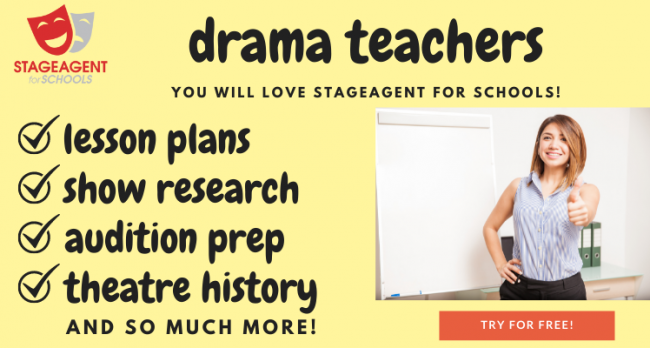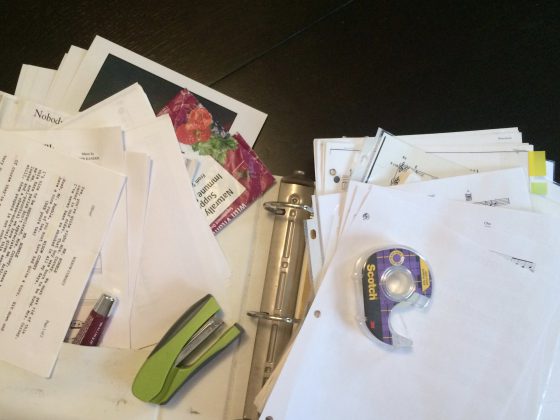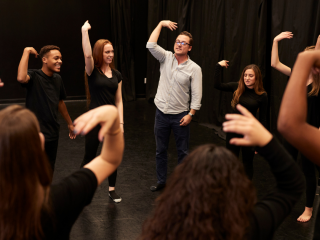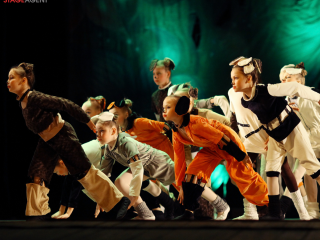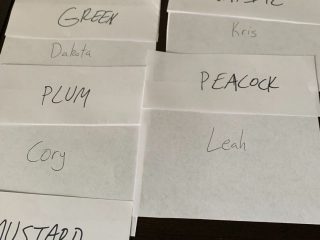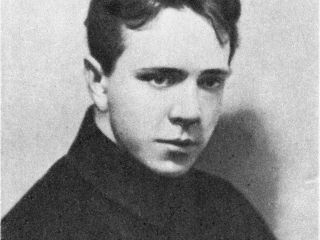I’ve been in a writing rut. Every few years, I crank out a play that I think is pretty decent. Then I hit the wall. I sit around waiting for inspiration to come, and am met with nothingness.
But recently, something happened. A few weeks ago, I saw a playwriting contest that came with a prompt. The prompt was specific. It had parameters and rules, and it outlined how long the script should be. It noted particulars that submissions had to include, and then–BAM! Inspiration. Immediately, the dialogue started flowing, and I was having the best time writing a script that I truly loved.
I needed the prompt to start writing. Very often–we need a prompt to start.
I would never tell my middle school students to just, “write a play” without suggested guidelines…and yet I expect myself to all the time. Often, our brains need something to latch onto to create. So, I’ve included a series of prompts that I often use with my students, along with some example scenes I give along with them.

PROMPT: Inanimate Objects
The characters are two inanimate objects engaged in a conversation. What do they talk about? How do they interact? Do they fight? Do they have things in common? Can they move in this scene?
LENGTH: 12-18 lines.
EXAMPLE:
CUP: Hey, how’s it going?
MUG: Oh…uhm. Hi.
CUP: What’s with the attitude?
MUG: Nothing, I don’t have an attitude.
CUP: That’s not true. You always act like you think you’re better than me.
MUG: I mean…you said that, not me.
CUP: But it’s true. That’s what you think.
MUG: I’m just…look, you’re aight. But…I mean, I have a handle.
CUP: So?
MUG: And I just don’t associate with handle-less drinking containers.
CUP: Wow.
MUG: Because like, obviously I’m the superior container.
CUP: Is that so?
MUG: It just is what it is, dude.
(A person comes and picks up CUP)
CUP: Look at that. Seems like someone prefers me.
MUG: (in shock) I–well….whatever.
PROMPT: First Line
LENGTH: 16-20 lines.
Your scene should have 2-4 characters, and can be about anything you like! However, the first line of your scene MUST be, “What are you doing here?”
EXAMPLE:
A: What are you doing here?
B: Sorry?
A: I said, “What are you doing here?”
B: Oh, am I not supposed…to be here?
A: The sign says, “Do not enter under any circumstances.”
B: Does it?
A: It’s right there.
B: (squinting) It’s a very small sign.
A: It’s a normal-sized sign.
B: Well I didn’t see it.
A: Well. I. Well.
B: Yes?
A: You’re not supposed to be here. Is what I’m saying. You shouldn’t be here.
B: (Unmoving) Sure, okay.
A: So leave?
B: Oh, right! Sure. (B tries to leave, but doesn’t know where to go.) What are you doing now?!
A: You could really use an exit sign, too.
PROMPT: What Aliens Think
LENGTH: 16-22 lines.
Your scene should have 3 characters who are space aliens. Write about their perceptions of Earth!
EXAMPLE:
GLORP: Greetings. How is the observation tank?
KREP: Greetings Glorp.
FRAP: Salutations, Glorp.
GLORP: (irritated) Yes yes, greetings greetings. Now tell me reports of the observation tank.
KREP: Frap?
FRAP: No, no Krep. You do the honors.
KREP: (sighing) I’m afraid it’s not good, Sirp. Oxygen quality is poor, continued floods, fires, heat waves, hurricanes.
GLORP: Is the planet inhospitable?
KREP: Not quite, but there may only be a few hundred years left.
GLORP: (swearing) Frabble.
(Beat)
FRAP: Excuse me, Glorp? Sirp? Is it…is it even worth invading Earth if it is only hospitable for a few hundred more years?
GLORP: I’m not sure that it is. (Beat.) Based on your observation, Is there a way in which the damage could be undone?
KREP: Likely not undone but perhaps stopped.
GLORP: And how might we do such a thing?
FRAP: I’m afraid, Sirp–it would require eradicating the human race.
GLORP: I’d hoped to avoid that.
FRAP: I know.
GLORP: They’re so cute.
KREP: SO cute.
GLORP: But I guess it must be done.
KREP: Should we…begin the process?
GLORP: …Yes. Yes, begin.
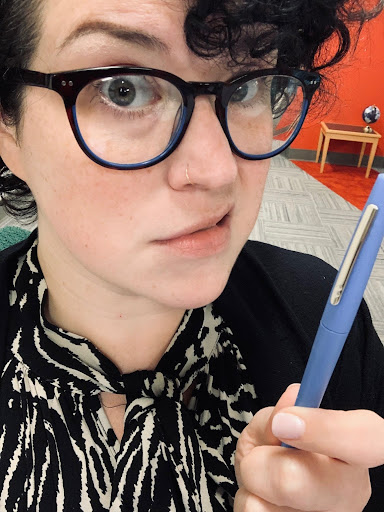
PROMPT: Adjective Monologue
LENGTH: Roughly one-minute in length.
Pick three random adjectives from the adjective bowl. With your three random adjectives, decide what kind of person embodies those qualities. Write a monologue from their perspective.
MY THREE RANDOM ADJECTIVES: confident, paranoid, nostalgic.
EXAMPLE:
JEFFREY
HEY! Hey! What are you looking at? Excuse me, what are you looking at? Are you looking at me? (Beat) Ah. Yes, of course. It must be my muscles. No, no. I get it. I can hardly blame you for staring. I have been working out, ya know. Putting in a lot of hours at the gym. Honestly, I feel like everyone there is out to get me. No no no, hear me out. It’s like–in walks this handsome guy, which! By the way! Is not my fault, right? Like I was born good-looking, so don’t blame me, am I right? So I’m already the most good-looking guy there, or at least top 2%, right? And then here I am, also the most studly and ripped. Obviously people are going to resent me. Be after me, right? Jeez, why can’t it be like the good ol’ days? Back when handsome people were respected and lauded. My father was handsome, and people just worshiped him. But in 2021? Nope. It’s like it’s a crime to be a good-looking man making gains in the gym. People think I’m just some shallow goon. Where’s the respect? (Suddenly) Hey! Hey you! Over there! Did you see that guy? He was looking at me. Following me, I think. They really are out to get me, I tell you. They really are. Sometimes I think my looks are really a curse.
PROMPT: COLLABORATIVE WRITING
One of my favorite things to do with young people is playmaking, or a collaborative playwriting process.
I give my students a prompt that I learned in a graduate playmaking class. It is my favorite of all prompts. “Things adults think they know but they don’t.”
Instead of asking them to write a scene, I ask them to list at least 5 things that adults think they know, but don’t. Often they’ll talk about gaming, technology, slang, new trends. But sometimes you’ll get a deeper dive. Adults don’t understand my homework, how difficult school is, that they embarrass me, that a B is a good grade, my anxiety, my love life, how to make friends, me.
From there, I collect their anonymous answers and we begin to sort them into like categories. I may pick specific themes that show up a lot–or particular topics that I find interesting, and from there, we make new prompts together. Then, we keep crafting new ones as we go.
Let’s say, as an example, a group has mentioned a lot of technology, a lot of anxiety and a lot of school-related ideas. Perhaps I make these prompts:
- Adults having anxiety about technology
- Adults not understanding modern-day school
- When school technology goes wrong
- How technology affects anxiety
- How anxiety affects school
Then, let’s say that one of those scenes features a really fun teacher-character that a student made up named Mr. Hawkins. And another strong scene shows that our technology was sent by aliens to give us anxiety. From there, there are new prompts:
- Mr. Hawkins meets an alien.
- Why aliens want us anxious.
- What aliens worry about.
- What Mr. Hawkins worries about.
We let the stories lead us. The work we respond to the most continues to navigate our writing, and eventually it’s possible to cobble together some fully collaboratively-written piece. It’s lots of work and lots of editing, but can make for a great long-term class project.
Ultimately?
Don’t be afraid to play. Don’t be afraid of structure. Within the structure is the freedom to write. Using the same prompt, I get wildly different outcomes. Have fun making up some of your own! Happy writing!


